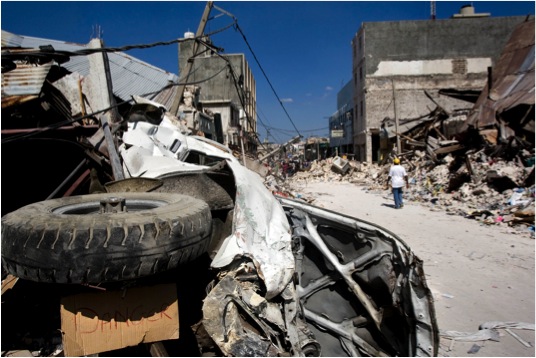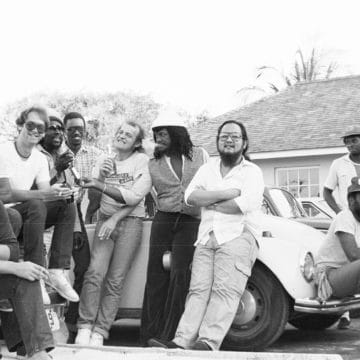Above: A man walks past rubble in downtown Port-au-Prince after the January 2010 earthquake (UN Photo/Marco Dormino)
By Ilio Durandis
CJ Contributor
Now comes time for remembrance. What history will surely describe as the darkest day in Haitian history, in terms of lives lost and unfulfilled dreams, the destruction on Jan. 12, 2010 is something that no other generation should ever have to go through again.
The colossal earthquake that shook Haiti, which left behind a river of blood, an ocean of tears, a city turned into a necropolis and instantly paralyzed a whole nation, could never be forgotten. Its lessons should be engraved in the soul of every survivor, children of this land, and witnesses the world over. As humans, we are indeed very vulnerable. Not only to the malfeasances of our fellow brothers and sisters, but most certainly to the naked and powerful force of nature, especially when we neglect and abuse the latter.
It took less than 45 seconds, for Haiti to lose 2.5 percent of its population, among them teachers, students, heads of household, future leaders, people who were not so famous, but yet played a vital role in giving hope to some unknown individuals. The loss on that day is still immeasurable. No statistics can do justice to the people afflicted by this tragedy.
How do we remember such a calamity? Do we commemorate the dead by erecting a national memorial on their behalf? Do we focus on the survivors and make sure that their needs are met? Do we go back to our lives pre-EQ, and force ourselves to forget, in order to feel some kind of normalcy? Or do we simply tell stories of what it was like on that infamous moment, hoping that we will get the sympathy of those who would read or hear them?
There’s no perfect way to remember that ruinous day. But to come together as one people and devise a national strategy to care of each other, especially the less fortunate in our society, could prove to be the difference maker as we try to pick up the pieces and build a prosperous future, where everyone would have access to attain all of their potential.
Remembering and commemorating that painful day gives us all an opportunity to reflect on the past and let our imagination navigate the possibilities of the future. We should commend ourselves to rise above our obligations, in order to bring to reality the dreams of our forefathers, which were not that much different than those of the people who perished, were crippled or lost everything in a blink of an eye: to be free and live in harmony as brothers and sisters.
The wounds are still fresh; for many the healing has not even begun. And yet, in some quarters, it is as if nothing happened. More than half of a million people are still homeless and living in endangered conditions. For them, hope is scarce, if not extinct. Families who lost their sole bread-winners are left to be part of a larger and complex statistical database. Daily lives cannot be separated from the evidence that something horrible took place here and yet the focus and priorities seem to have gone haywire.
The feeling that Haitians have completely lost control of their fate is probably the one outcome that has shined the most post-earthquake. In the immediate aftermath, the outside world provided relief and the good of humanity could be felt. But the more time passes, the clearer it becomes that the long-lasting effect of the earthquake would be the compromise of the nation’s integrity.
It is hard to find one Haitian programme that is funded by Haitians and completely led by Haitians. The government has completely turned the table from an internal focus to a magnetization of outsiders. The Preval government did very little after the immediate shock, and as a consequence, foreign organizations are seemingly in control of providing most of the basic services, which ought to be the responsibility of the state.
Some of us will reflect on that day to remember loved ones and how lucky we are to still be alive; others will reminiscent of old neighbourhoods and memories of the recent past, and still another group would feel completely annihilated. But there’s a last group, who will use this moment to think of the positives that have taken place and bank on the hope that the near future will be better.
We can only cry for so long, complain about so many things, and remain in despair for a definite time that eventually we have to accept it is our responsibility to build back our country. This time is one that calls for us to not only perform our task, but to exceed the expectations. It is not so much about caring for the poor as it is about making sure we create an all-inclusive and fair society.
The negligence of the past caused senseless loss of lives, and exacerbated the impact of the earthquake. It is with sadness that not much is being done today to limit the effect of the next roar of nature. Buildings that were cracked are simply being reinforced and turning into living spaces. Street merchants are allowed to sell their goods under compromised structures. Haitians are still exposed to the elements that made them very vulnerable in the first place: Human negligence.
The remembrance of Haiti’s darkest hour lives and indelibly inscribes in the daily soul of its people. There is no possible way to ever forget, but on the way to rebuild, the memory of those no longer here must be honored and served as strength to move forward.
Ilio Durandis, a Caribbean Journal contributor, is the founder of Haiti 2015, a social movement for a just and prosperous Haiti. He is a columnist with The Haitian Times.







